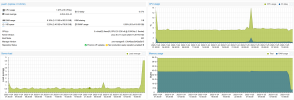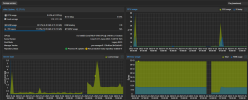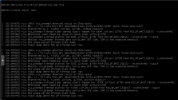You have to use the new version of the driver. You can look it up in the changelog of R8168-dkms package:
The problem: it requires dkms >= 3.0.11
So you have to do the following:
apt-get install linux-headers-6.5.11-4-pve (to install the new headers)
download the dkms 3.0.12-1 package from here:
LINK
download the r8168-dkms 8.052.01-1 from here:
LINK
copy it to the proxmox server
apt-get install ./dkms_3.0.12-1_all.deb
apt-get install ./r8168-dkms_8.052.01-1_all.deb
And voila - it is working again without risking the old bug occuring after some weeks of uptime.
Hollo,
I tried this but in my case, installing headers failed :
root@pve:~# apt-get install linux-headers-6.5.11-4-pve
Reading package lists... Done
Building dependency tree... Done
Reading state information... Done
Note, selecting 'linux-headers-6.5.11-4-pve-amd64' for regex 'linux-headers-6.5.11-4-pve'
Note, selecting 'proxmox-headers-6.5.11-4-pve' instead of 'linux-headers-6.5.11-4-pve-amd64'
proxmox-headers-6.5.11-4-pve is already the newest version (6.5.11-4).
proxmox-headers-6.5.11-4-pve set to manually installed.
0 upgraded, 0 newly installed, 0 to remove and 0 not upgraded.
1 not fully installed or removed.
After this operation, 0 B of additional disk space will be used.
Do you want to continue? [Y/n]
Setting up r8168-dkms (8.051.02-2) ...
Removing old r8168-8.051.02 DKMS files...
Module r8168-8.051.02 for kernel 6.2.16-19-pve (x86_64).
Before uninstall, this module version was ACTIVE on this kernel.
r8168.ko:
- Uninstallation
- Deleting from: /lib/modules/6.2.16-19-pve/updates/dkms/
- Original module
- No original module was found for this module on this kernel.
- Use the dkms install command to reinstall any previous module version.
depmod...
Deleting module r8168-8.051.02 completely from the DKMS tree.
Loading new r8168-8.051.02 DKMS files...
Building for 6.2.16-19-pve 6.5.11-4-pve
Building initial module for 6.2.16-19-pve
Done.
r8168.ko:
Running module version sanity check.
- Original module
- No original module exists within this kernel
- Installation
- Installing to /lib/modules/6.2.16-19-pve/updates/dkms/
depmod...
Building initial module for 6.5.11-4-pve
Error! Bad return status for module build on kernel: 6.5.11-4-pve (x86_64)
Consult /var/lib/dkms/r8168/8.051.02/build/make.log for more information.
dpkg: error processing package r8168-dkms (--configure):
installed r8168-dkms package post-installation script subprocess returned error exit status 10
Processing triggers for initramfs-tools (0.142) ...
update-initramfs: Generating /boot/initrd.img-6.5.11-4-pve
Running hook script 'zz-proxmox-boot'..
Re-executing '/etc/kernel/postinst.d/zz-proxmox-boot' in new private mount namespace..
No /etc/kernel/proxmox-boot-uuids found, skipping ESP sync.
System booted in EFI-mode but 'grub-efi-amd64' meta-package not installed!
Install 'grub-efi-amd64' to get updates.
Errors were encountered while processing:
r8168-dkms
E: Sub-process /usr/bin/dpkg returned an error code (1)
Can you help ?
Thanks




